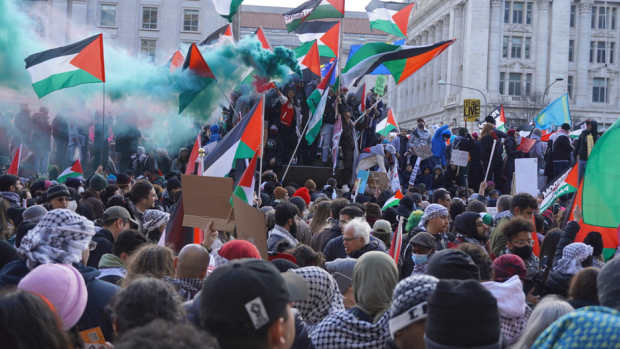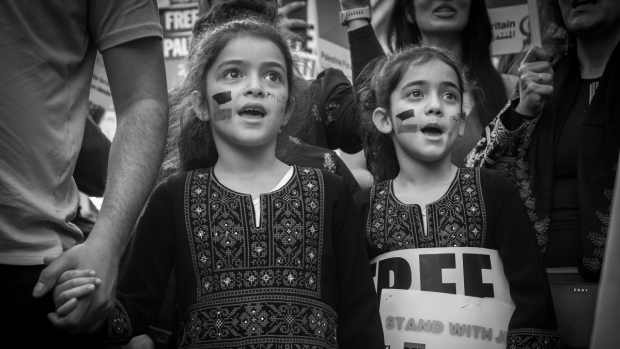As the Palestinian death toll in Gaza and the West Bank mounts daily, campus protests against Israel’s genocidal war on Gaza continue to spread across the U.S., where students and faculty often face police crackdowns. Student activists from in southern California, in Ithaca, New York, and in St. Louis, Missouri, told Truthout the blows landing hardest are the ones from their own chancellors and deans. The activists say university administrators are waging an asymmetrical campaign of enforcement against students demanding an end to their schools’ complicity in the slaughter of Palestinians.
“We see Pomona for what it is: serving capital and empire. And we know the way to win our is to disrupt their flow of cash, disrupt their reputation,” said Amanda Dym, a 21-year-old humanities student at Scripps College, one of the five colleges in the Pomona consortium. “We won’t allow our administrators who facilitate and defend investments in an apartheid state to go about their work undisturbed.”
Dym was among 20 students arrested by cops in riot gear during a sit-in outside Pomona President G. Gabrielle Starr’s office on April 5.
“A televised genocide live-streamed on our phones is obviously unlike anything that’s happened in our lifetimes,” she said. That’s why Dym and others were moved to demonstrate, but she says when Starr called in the riot police, the president put them in a whole other category of risk.
“Obviously, it was a scary day, to watch 30-plus riot cops from three cities come in and start bringing my comrades out, one by one,” Dym told Truthout. “The cops were in full gear with automatic weapons, bigger guns than some of us had ever seen. They were yanking students up off the ground, zip-tying their hands so tightly they were losing circulation.”
Dym, who identifies as Jewish and white, says she can’t take genocide or the arrests and banishment from the Pomona campus lightly. But she wonders about the administration.
“We were sitting in the lobby [for] nearly two hours. Starr had — along with the vice president, COO and treasurer Jeff Roth, and other administrative staff members — locked herself in her office. Periodically, we heard laughter emerge from the president’s office,” she said. “As to whether [Starr] took putting her students’ lives on the line seriously or not, I don’t know. But I do remember quite vividly their laughter as these events were unfolding.”
Seven Pomona College students were suspended for participating in the April 5 sit-in, and four of them have not had their interim suspension lifted yet, according to Dym.
“They’ve been tossed around by the school, evicted from their housing, were not able to go to the dining halls, had to be escorted by a campus safety officer to pick up their belongings,” Dym said. “These are Black, Brown, low-income students who were engaging in the sit-in the same as the rest of us, but for some reason got treated completely differently.”
Every attempt to divide and conquer only strengthens the students’ bond, she said, adding, “I don’t think President Starr is really reckoning yet with the possibility that students overwhelmingly are demanding divestment. We’re not some fringe group; we were backed by 60-plus organizations on campus. We will not stop in this fight until we win divestment.”
It’s not just Pomona where protesters have felt threatened. Cornell and Washington University administrators have called police to arrest and frighten their students this spring. The charges so far have been petty misdemeanors such as failure to disperse, trespass and disturbing the peace, but there’s nothing nonchalant about encounters between protesters and armed police.
RJ Lucas, a Washington University senior of Bolivian heritage, celebrated on March 19 when the by a vote of 15-5. He was glad to see the failure of an attempt to impeach the Senate speaker who’d helped pen the resolution and presided over the vote. But April 13 was rocky. He told Truthout about a fleeting but menacing moment when, in the process of removing him from a sit-in at Graham Chapel, an officer looked right at him and placed his hand on his holster. Just after that, one of the tires on his vehicle was slashed 25 times. Reporting the disturbing incidents to Dean Nicole Gore and police was not fruitful.
“Yeah, we told them about it,” Lucas said, “but it’s like they don’t see a threat against pro-Palestinian activists as real. We’re asking them to treat us like humans, not pawns.” The experience was angering, he said, but “the anger was filling in a gap of feeling completely, utterly dehumanized.”
Daniel Cazares, also a Washington University senior, is hoping to switch focus from business and computer science to anthropology if the university lets him stay. He was also arrested at the April 13 sit-in and plans to bring a lawyer with him to his conduct meetings, the first of which was earlier this week.
“This is a pro-Palestine movement,” Cazares said, “but it has also become an anti-university movement at the same time because we don’t believe that universities have our best interests in mind.”
And it starts at the top.
Cazares recalled being invited to a baseball game billed as a chance for first year students to meet the chancellor and chat informally over a game of baseball.
“We were in, like, a little private lounge,” he said. “The chancellor comes in, takes a photo, shakes hands with all the students, and then basically doesn’t say another word to us, talking only to the other administrators,” he said.
Chancellor Andrew D. Martin’s stance toward students wishing to end the genocide in Gaza has become the subject of an dated April 26 that’s garnered over 130 signatories among the university’s faculty, staff and graduate students. Among its signatories is Bret Gustafson, a tenured professor of anthropology, who Cazares says was baselessly accused of last semester by social media accounts belonging to LibsOfTikTok and StopAntiSemitism.
His ostensible offense was a post to X, formerly known as Twitter, supportive of a protest at the home of an AIPAC executive in Los Angeles. The comment was enough to set off a right wing firestorm of doxxing, calls to the university, attempts to have him fired and some 50 death rates according to .
Cazares says that higher-ups in the WashU administration actually began sending in administrators to sit in on his classes, to “ensure student safety.”
The letter urges more care and concern for the arrested students, introduces a petition to reverse their suspensions, and pokes at the chancellor’s contradictions on free speech and expression:
No matter where one stands on the ongoing violence against Gaza or whether Boeing is a good associate for the university, one should be concerned that the attacks on freedom of speech and academic freedom have increased significantly in our country and on this campus. These attacks come despite public statements by Chancellor Martin in support of freedom of speech. Paradoxically, the Chancellor’s statements invariably come with caveats, saying what students and faculty can and cannot say. According to our own free speech experts, this is absurd. Qualifying and bracketing which ideas are and are not acceptable undermines the very assertion that the university supports free expression.
Cazares’s family history has shaped his view of powerful American institutions — and has solidified his anti-colonial solidarity with Palestinians. His grandfather was born a U.S. citizen in California, but during the Great Depression, was removed to Mexico by vigilantes when he was only 12 years old. He eventually returned to the U.S. as an adult.
“He was born in the same state of California I was born in. When you know that, no matter how much of a ‘good immigrant’ any of us are, when times get tough for America, America will not hesitate to throw us to the curb, to feed us to the dogs,” Cazares said. “I absolutely believe those anti-colonial histories were honored and affirmed on that Saturday at the sit-in.”
Lucas and Cazares say they received death threats on a student chatting app when an anonymous commenter wished specifically that when returning to St. Louis for their June court appearances, they be flown in on “Pinochet Air.” This is a taunting reference to the Chilean dictator who executed some of his enemies by having them tossed from a helicopter.
“WashU is such a poisoned place,” Cazares said.
Meanwhile, by the time this article is published, Sara Almosawi, a junior at Cornell studying sociology, and Nick Wilson, a second-year student in Cornell’s Industrial and Labor Relations program, will be living outdoors in on the arts quad. The solidarity encampment, established pre-dawn on the morning of April 25, is a culmination of sustained, intense and successful organizing, including the passage on April 21 of a historic referendum. Undergraduate students voted 2:1 to push Cornell to call for a ceasefire and divest from 10 weapons manufacturers, including Boeing, ThyssenKrupp, Elbit Systems, RTX and Lockheed Martin.
Almosawi, who’s the first member of her family to attend college, told Truthout her reasons for taking risks in solidarity with Palestinians are pretty personal. Both her Iraqi dad and Indonesian mom had their lives disrupted and redirected because of the U.S.
“My mom immigrated because of a religious conflict that was instigated by the U.S.; her family wasn’t safe, so she had to move here. My dad’s family had a gas station that was bombed during the Iraq War. Over 100 people died in the attack,” she explained. “That’s why I’m so passionate about this. I wasn’t super involved with antiwar movements before Palestine, or before October 7, but this has been very empowering for me and just so pertinent to who I am, and to the left today.”
Both Almosawi and Wilson were among the 24 students at the Cornell University Board of Trustees meeting.
It wasn’t unexpected.
“If you’re in this movement, you’ll be called ‘antisemitic,’” Almosawi said. “You will have the cops called on you. There’s this social pressure, this carceral force happening from the administration. Your jobs will be on the line, there’s , you’ll get doxxed. But there’s also this real seriousness about what we’re doing that demands a level of incredible commitment to the cause.”
That bedrock commitment was the draw for Wilson too — at least initially.
“What’s kept me here has been the outstanding courage of all the students that are involved,” he said. “Their willingness to stand up and take a real risk and become faces of this movement. They’re the kind of people where you meet them and you ask, what can I do to even come close?”
Almosawi and Wilson hope the encampment will be a daily reminder to Cornell’s trustees that they made a commitment in 2016 to divest from companies engaged in “genocide, apartheid, and systematic cruelty against children.” That promise puts them in a distinctive category and poses a challenge that Cornell President Martha Pollack cannot avoid in their view. Not to divest violates the board’s own policies and can only be construed as an act of “genocide denialism,” they say.
“Cornell may think in the short term, cracking down on student protest is a viable strategy to crush student organizing. But with the resilience we’ve shown, and other universities have shown in the face of that intimidation, it’s made it more clear that in the long term, this kind of intimidation is a threat to their legitimacy,” Wilson said. “It’s something that will tear the university apart if they continue to do it.”
Almosawi says they’re heeding the calls from resistance organizers across the globe, including Congo and Sudan, on how to support them from the belly of the beast. “Military divestment seems most impactful, in that sense,” she said.
“Ithaca is very much a community bound within itself. It’s a sleepy, progressive town upstate, and Cornell relies on that to keep its complicity quiet. But,” says Almosawi, “their silence only amplifies our cries for a free Palestine.”
FRANCES MADESON
Frances Madeson has written about liberation struggles in the U.S. and abroad for Ms. Magazine, VICE, YES! Magazine, The Progressive Magazine, Tablet Magazine, American Theatre Magazine and Indian Country Today. She is also the author of the comic novel Cooperative Village.









